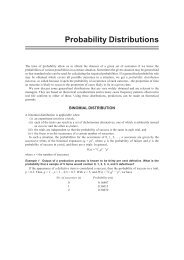International-Business-Dr-R-Chandran-E-book
International-Business-Dr-R-Chandran-E-book
International-Business-Dr-R-Chandran-E-book
You also want an ePaper? Increase the reach of your titles
YUMPU automatically turns print PDFs into web optimized ePapers that Google loves.
Tariff Barriers<br />
191<br />
<strong>International</strong> <strong>Business</strong>- <strong>Dr</strong>. R. <strong>Chandran</strong><br />
A tariff barrier is a levy collected on goods when they enter a domestic tariff<br />
area (DTA) through customs. Tariff refers to the duties imposed on<br />
internationally traded commodities when they cross national boundaries and<br />
may be in the form of heavy taxes or custom duties (operated through a price<br />
mechanism) on imports, so as to discourage their entry into the home<br />
country for marketing purposes.<br />
Tariffs enhance the price of the imported goods, thereby restricting their<br />
sales as well as their import. Governments impose tariffs only on imports<br />
and not on exports as they are interested in export promotion. Only a few<br />
exported items of any country are taxed.<br />
The aim of a tariff is thus to raise the prices of imported goods in domestic<br />
markets, reduce their demand and thereby discourage their imports.<br />
Tariff barriers are major determinant factor to build or get away from the<br />
business. In India, over the past ten years the prime import duty has been<br />
reduced to 15% from 100% on many consumer durables and electrical items.<br />
Classification of Tariffs<br />
A) On the basis of origin and destination of the goods crossing national<br />
boundaries<br />
1. Export duty: An export duty is a tax levied by the country of origin, on a<br />
commodity designated for use in other countries. The majority of<br />
finished goods do not attract export duty. Such duties are normally<br />
imposed on the primary products in order to conserve them for domestic<br />
industries. In India, export duty is levied on oilseeds, coffee and onions.<br />
2. Import duty: An import duty is a tax imposed on a commodity originating<br />
in another country by the country for which the product is designated.<br />
The purpose of heavy import duties is to earn revenue, to make imports<br />
costly and to provide protection to domestic industries. Countries impose<br />
heavy import duties to restrict imports and thereby remove the deficit in<br />
the balance of trade and balance of payment.<br />
3. Transit duty: A transit duty is a tax imposed on a commodity when it<br />
crosses the national frontier between the originating country and the<br />
country which it is cosigned to. African and Latin American nations<br />
impose such transit duties at any point of time. Sri Lanka is another<br />
country enjoying such benefits from Indian companies.<br />
Only for Private Circulation





